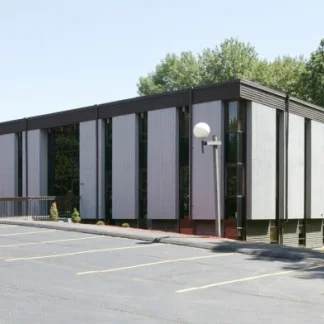InterCommunity
InterCommunity is a community health non-profit organization located in East Har...
Rushford Center is an accredited dual-diagnosis substance use disorder rehab in Glastonbury, CT. Rushford strives to provide affordable, accessible services that are evidence-based and high quality and embrace up-to-date methods in prevention, treatment, and recovery.
With a holistic approach, Rushford offers a full continuum of programs and treatments to help clients start and maintain long-term sobriety.
Rushford offers medical detoxification services where clients can safely and comfortably detox from opioids, benzodiazepines, alcohol, or other substances. This crucial step helps individuals safely transition from active substance use, with medical professionals closely monitoring and managing the withdrawal symptoms.
Medication-assisted treatment (MAT) at Rushford may be provided to those with opioid and alcohol addictions. This evidence-based approach uses FDA-approved medications in conjunction with counseling and behavioral therapies.
Rushford’s 42-bed residential program offers flexible, gender-specific treatment in a private setting that incorporates individual counseling, group therapy, family involvement, and regular 12-step meetings.
Outpatient treatment at Rushford offers varying levels of treatment that adapt to clients’ individual therapeutic needs. Sessions can range once a week while intensive outpatient therapy (IOP) ranges from 10-15 hours over five days. Both programs are short-term and are often used as a step down from residential treatment, or prevent the need for that level of care.
Rushford’s aftercare services reinforce the skills and coping mechanisms developed during treatment. Whether through counseling, support groups, or continued learning sessions, individuals are equipped to maintain their sobriety.
Contact us for more information: (860) 657-8910

Connect with Rushford Center by calling their admissions team directly.
(860) 657-8910 Website Get DirectionsGroup therapy is any therapeutic work that happens in a group (not one-on-one). There are a number of different group therapy modalities, including support groups, experiential therapy, psycho-education, and more. Group therapy involves treatment as well as processing interaction between group members.
In individual therapy, a patient meets one-on-one with a trained psychologist or counselor. Therapy is a pivotal part of effective substance abuse treatment, as it often covers root causes of addiction, including challenges faced by the patient in their social, family, and work/school life.
Trauma therapy addresses traumatic incidents from a client's past that are likely affecting their present-day experience. Trauma is often one of the primary triggers and potential causes of addiction, and can stem from child sexual abuse, domestic violence, having a parent with a mental illness, losing one or both parents at a young age, teenage or adult sexual assault, or any number of other factors. The purpose of trauma therapy is to allow a patient to process trauma and move through and past it, with the help of trained and compassionate mental health professionals.
In individual therapy, a patient meets one-on-one with a trained psychologist or counselor. Therapy is a pivotal part of effective substance abuse treatment, as it often covers root causes of addiction, including challenges faced by the patient in their social, family, and work/school life.
Trauma therapy addresses traumatic incidents from a client's past that are likely affecting their present-day experience. Trauma is often one of the primary triggers and potential causes of addiction, and can stem from child sexual abuse, domestic violence, having a parent with a mental illness, losing one or both parents at a young age, teenage or adult sexual assault, or any number of other factors. The purpose of trauma therapy is to allow a patient to process trauma and move through and past it, with the help of trained and compassionate mental health professionals.
Trauma therapy addresses traumatic incidents from a client's past that are likely affecting their present-day experience. Trauma is often one of the primary triggers and potential causes of addiction, and can stem from child sexual abuse, domestic violence, having a parent with a mental illness, losing one or both parents at a young age, teenage or adult sexual assault, or any number of other factors. The purpose of trauma therapy is to allow a patient to process trauma and move through and past it, with the help of trained and compassionate mental health professionals.
InterCommunity is a community health non-profit organization located in East Har...
Downtown Manchester Outreach Project is a private rehab located in Manchester, C...
Focus On Recovery United is a private rehab located in East Hartford, Connecticu...
Connection Counseling Center - Garden Street offers outpatient treatment for ind...